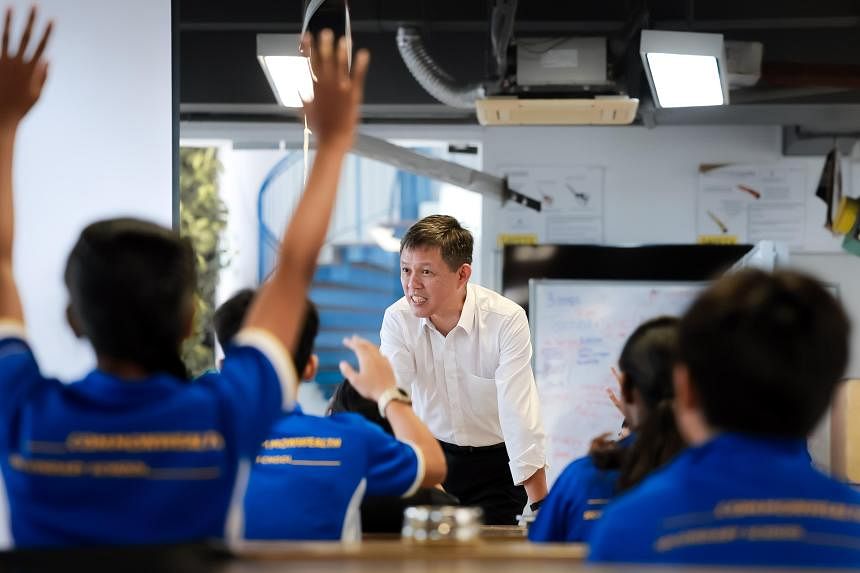SINGAPORE - In other countries, where one is born – into poverty, or in a rich or poor neighbourhood – often determines one’s access to resources in schools, but it is different in Singapore, said a leader of a global federation of teachers’ unions.
“There is that equality of funding as a baseline, so there’s no constant worry about whether you are going to have enough teachers or support,” said Dr David Edwards, the general secretary of Education International.
He was speaking to The Straits Times on April 24 about his key takeaways from the International Summit on the Teaching Profession, a gathering of education leaders focused on improving teacher quality and education standards.
Singapore, for the first time, hosted the summit’s 14th edition, which ran from April 22 to 24 at Raffles City Convention Centre.
It was attended by 140 delegates from 18 other countries, including Estonia, China and Australia, who visited Singapore’s primary and secondary schools as well as institutes of higher learning and other training institutes.
Dr Edwards recounted his visit to Si Ling Primary School in Woodlands on April 22, where he visited the school’s rooftop garden and noticed that each pupil had an iPad to assist them with lessons.
“I first thought that this school was an elite school,” he said, likening it to a high school in Beverly Hills in the United States. “But then, I realised that it was just a regular, neighbourhood school.
“Here, your zip code does not determine your destiny,” he said.
Education Minister Chan Chun Sing said, in his closing speech, that a student’s financial background should not determine his or her destiny. “Instead, the methods and focus of our education system can and should be the determinants of the outcome,” he said.
“We must ensure that students in Singapore, regardless of background, are able to rise beyond their lack of family support.”
Mr Chan said he is committed to democratising access to teaching materials and technology, ensuring that students can continue to dream big as long as they are born here.
“Our brand of meritocracy is with Singapore characteristics, which will allow each and every child to go as far as they need,” he said.
He also spoke about the need for a balanced approach to managing educational technology, along with the urgency of upskilling and reskilling teachers for future challenges.
“The fundamental principle remains, we take care of our teachers, and our teachers will take care of our children,” he said.
At the closing session, educational leaders from around the world shared their insights and commitments, including ensuring students receive adequate support and prioritising the well-being of teachers and improving their working conditions.
There was also a focus on increased international cooperation and learning from one another’s practices, with many countries committed to investing in attracting individuals to teacher training programmes and retaining teachers in the profession.
The first edition of the summit was held in 2011 by then US Secretary of Education Arne Duncan, and it was designed to engage governments and organisations worldwide in discussions about how to strengthen education through a stronger teaching profession.
The summit became an annual event and has been hosted by countries like the Netherlands, New Zealand, Canada, Finland and Spain. It has been co-hosted by the Organisation for Economic Cooperation and Development (OECD) and Education International every year.
Speaking to ST, OECD deputy secretary-general Yoshiki Takeuchi said that on top of determinants like OECD’s Programme for International Student Assessment, it is crucial to develop 21st-century skills like curiosity and creativity.
“Subjects like mathematics and reading are important; they are a building stone for everything, but in addition to that, education is something that would provide you with self-esteem,” Mr Takeuchi said.
He added that the visits to the various schools and institutions in Singapore made him realise that “in this country, people accept diversity”.
“People want to make sure that no one is left behind,” Mr Takeuchi said, recalling how, on a visit to Punggol View Primary School on April 24, he saw pupils as young as seven being taught the importance of accepting others.
“This sort of conviction is shared among government, teachers and everyone, so they are all looking in the same direction.”
Dr Edwards said another aspect that stood out for him was the multicultural respect and diversity he saw during his school visit, citing the example of Hari Raya decorations that had been put up. In other countries, this would be potentially controversial, he said.
He said: “You have to have a system that prioritises inclusiveness, you have to have teachers and a school leadership that believe in that, and families and communities that are a part of that, and this bodes well for the future of Singapore.”


